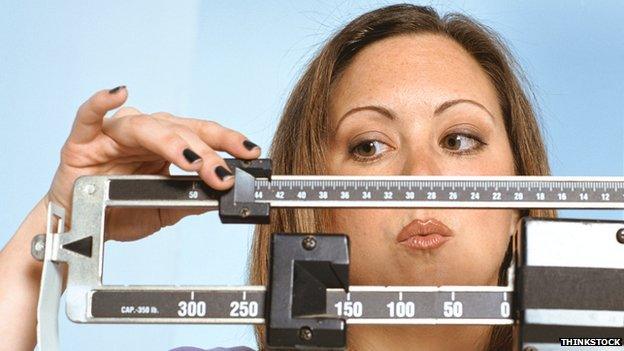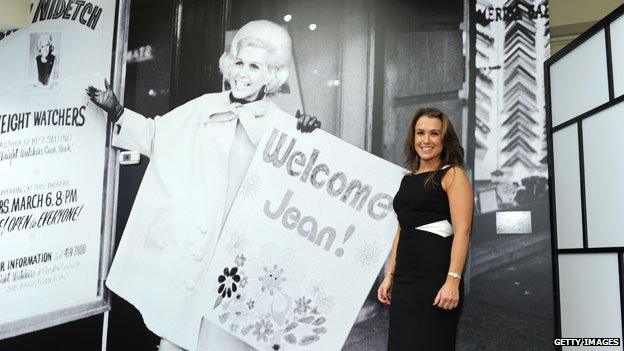What happens at Weight Watchers clubs?
- Published

Jean Nidetch, founder of Weight Watchers, has died. A million people are members of the weight-loss clubs she created - but what goes on at them and how do they work?
Those who have joined Weight Watchers speak of the buzz of stepping on the scales and realising they've lost a few pounds.
Around one million people, external are weighed, one-by-one, at 40,000 weekly club meetings globally. Individual performances remain secret, but the total amount lost or gained by the group since the last session is totted up and revealed.
The emphasis is on doing it together. The 10,000 "leaders" running the groups, providing a "fun and informative talk" each time, have been through the Weight Watchers programme themselves.
It's more than 50 years since Jean Nidetch, who had struggled with her weight since childhood, started the first group in New York. Members are introduced to a points-based scheme, under which those wanting to lose weight keep scores for the week, effectively noting down their calorie intake and not exceeding their specified limit.
They are encouraged to stick to a plan, ensuring a reduced weight is sustainable, and check food labels. This is known as "tracking".
The points plans vary a little by country. In the UK, the ProPoints system allows individuals a daily allowance of points, based on height, weight, age and sex. These do not simply represent calories, but take into account protein, carbohydrate, fat and fibre content.
There is an extra allowance of points over the week on foodstuffs not normally recommended, such as beer and biscuits, by way of a treat.

Heather Nidetch celebrates the company's 50th birthday
"It takes into account how your body processes food and nudges you towards healthier, more satisfying choices," says the company. "So, when you follow Weight Watchers do not think you will eat less - you will however eat better than ever before. You may find yourself surprised at all the wonderful foods you can enjoy every day."
The clubs work to reinforce the central message of continuity and camaraderie. There are also one-to-one sessions between members and leaders.
"The way to reduce your body weight is to reduce calories," says Klim McPherson, visiting professor of public health epidemiology at Oxford University. "That's unequivocal. [Clubs] provide a kind of pressure on people to cut calories and restrict calories. They make sure you keep to it all the time."
So how do the "nudges" feel for members?
"It's an unsettling feeling knowing others queuing behind you are watching and judging while you remove every last piece of jewellery and as much clothing as is humanly possible," says former Weight Watcher Sarah (not her real name), "and wonder whether not washing your hair that morning is weighing you down and cursing wearing jeans rather than a light summer dress. I even shaved my legs especially.
"I didn't stick with the Weight Watchers programme but can see why it works for others as a motivational force."
But for those who have success with the programme, there is intense loyalty.
"Weight Watchers is a community of people where the common denominator is a weight problem, members are supportive and inclusive of all, regardless of ethnicity, religion or age," says Claire Jacobsen.
"It first helped me back in 2007 and 2008 in losing over seven stone to enable me to qualify for weight loss surgery. After years of other yo-yo diets I was 29 stone and a size 32 at the age of 33. The diet alone at that point couldn't help me further as my weight plateaued."
After the Weight Watchers programme and gastric bypass surgery, Jacobsen says she lost a total of 17 stone.
"I have recently struggled again with weight after a lengthy tumultuous divorce and rejoined Weight Watchers last month and have lost over a stone again... to enable me to get married this November to the man of my dreams in a 'normal' size, off-the-peg dress."
Deanne Jade, founder of the National Centre for Eating Disorders, external, says most weight-loss programmes result in the majority of members returning to their former size within two-and-a-half years.
"The Weight Watchers clubs use a very simple carrot-and-stick approach," she says. "It's very motivating for some people and very demotivating for others. The problem with the weigh-ins is that it's not the best way to measure health. Fat is actually quite light."
The usual monthly cost for UK members is £21.45 and $19.95 in the US. Once members hit their target weight they receive a Gold Member key. After this, as long as they stay within 5lb of that weight they can carry on attending meetings free for the rest of their life. They must attend a weigh-in at least five times a year to continue qualifying.
But products made by Weight Watchers, which Heinz bought for $71m (£46m) in 1978, are sold at meetings, providing a large revenue stream. In 2013, consumers spent about $13bn (£8.4bn) on the company's products and services.
Jade warns against a "one-size-fits-all" approach to weight loss, arguing that the causes of obesity are complex. Rewarding people for becoming lighter in a group setting, rather than focusing primarily on changing lifestyles and self-control, can produce unnecessary feelings of "guilt" and "shame", she adds.
However, in England the National Health Service has referred patients struggling with obesity to Weight Watchers clubs since 2007. A study carried out in 2010, external found that a third of those taking part had lost 5% or more of their initial body weight.
Nidetch claimed she maintained her lifelong goal of never exceeding 150lbs (68kg) again. "I just shake my head when I see someone eating cake and saying, 'Oh, I wish I wasn't heavy,'" she told the Sun Sentinel of South Florida in 2011, external. "But they keep eating the cake!" For many millions of people it's easier said than done to stop.
Subscribe to the BBC News Magazine's email newsletter to get articles sent to your inbox.